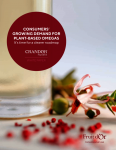Studies support green-lipped mussel's anti-inflammatory properties
mussels have been given a significant boost, as two new studies
report the potent benefits of the mussel's lipid fraction.
Researchers from Australia's RMIT University and SGE International Pty Ltd, report that novel omega-3 polyunsaturated fatty acids extracts from the green-lipped mussel ( Perna canaliculus ) inhibited leukotriene and cyclo-oxygenase (COX) activity, both of which are involved in the inflammatory process.
Chronic inflammation, brought about by an over-expression or lack of control of the normal protective mechanism, has been linked to range of conditions linked to heart disease, osteoporosis, cognitive decline and Alzheimer's, and type-2 diabetes.
The studies, published in consecutive issues of the journal Comparative Biochemistry and Physiology, Part B , looked at both commercial (Lyprinol) and super-critical carbon dioxide (CO2) extracts from the mussel, on both COX and leukotriene levels in vitro .
The first study reports that lipid extracts from the green-lipped mussel and Mytilusedulis (blue mussel) moderately inhibited COX-1 and COX-2 pure enzymes in vitro .
The Lyprinol commercial extract also exhibited strong inhibition of COX-1 and COX-2, wrote the researchers, with the free fatty acid and triglyceride fractions identified as the active anti-inflammatory compounds.
Hydrolysis of the extracts using potassium hydroxide or protease enzymes increased COX inhibition by up to ten-fold said the researchers.
"These results support the use of the commercial mussel extracts, in particular Lyprinol, as an alternative for conventional [non-steroidal anti-inflammatory drugs] NSAIDs and fish oil treatment in the relief of the symptoms of arthritis," concluded the researchers.
The second study extracted and isolated the free fatty acid fraction from the mussel and identified novel omega 3 polyunsaturated fatty acids (?-3 PUFA), thought to originate from the algae and other micro organisms unique to New Zealand waters.
Using supercritical CO2 extraction, followed by normal phase chromatography, followed by reversed-phase high performance liquid chromatography (RP-HPLC), the researchers identified the most bioactive fractions as C18:4, C19:4, C20:4, and C21:5. "
The C20:4 was the predominant PUFA in the extract, and was a structural isomer of arachidonic acid (AA) ," wrote the researchers. "
The novel compounds may be biologically significant as [anti-inflammatory] AI agents, as a result of their in vitro inhibition of lipoxygenase products of the AA pathway. "
The prostaglandins derived from omega-3 fatty acids are said to be anti-inflammatory, while prostaglandins derived from omega-6 fatty acids, like AA, are proposed to be pro-inflammatory.
"The inflammatory precursor AA is an ?
-6 PUFA of 20 carbons in length and has 4 unsaturated double bonds (positions 5, 8, 11 and 14) with each double bond being separated by one methylene group ," explained the researchers. "
The predominant bioactive PUFA of P. canaliculus identified in this study is similar to AA in that it also possesses 20 carbons with four double bonds.
However, the first double bond is located at the seventh position, and the second double bond is interrupted from the first by two methylene groups resulting in the double bonds at positions 7, 11, 14 and 17.
"The interrupted bond positioning of these structural analogues of AA may account for their AI behaviour, by competitively inhibiting the active site of enzymes which use AA as a substrate, i.e., LO and COX, thereby reducing the production of leukotriene (LT) and prostaglandin (PG) metabolites," they said.
The NZ green lipped mussel, ranked among the top 'eco-friendly seafoods' according to the US environmental agency Blue Ocean Institute's list, is already used a source of nutraceuticals.
The extract, a rich source of iron, betain, and glycoaminoglycans (including chondroitin sulphate) has gained a reputation amongst consumers as a natural product with anti-inflammatory properties - an effect that has been attributed to a body of science to its lipid factions.
The Greenshell, Green Lips and Greenback mussel trademarks are owned by the New Zealand Mussel Industry Council (NZMIC).
The majority of green-lipped mussel extract suppliers offer material that retains, to a greater or lesser degree of standardisation, the mussels' natural nutrient profile.
There are also a small number of products that contain high levels of stabilised lipids, such as Lyprinol marketed by Pharmalink, which is said to be "125 times more potent than the original freeze dried mussel powder."
However, a broad range of processes and different efficacies can be found amongst green lipped mussel extracts, and while the NZMIC is aware of this the onus is said to be very much on the industry to pull together and set standards.
Sources: Comparative Biochemistry and Physiology, Part B Volume 146, Pages 346-356 "Anti-cyclooxygenase effects of lipid extracts from the New Zealand green-lipped mussel, Perna canaliculus" Authors: S. McPhee, L.D. Hodges, P.F.A. Wright, P.M. Wynne, N. Kalafatis, D.W. Harney, T.A. Macrides Comparative Biochemistry and Physiology, Part B Volume 147, Pages 645- 656 "Novel anti-inflammatory ?
-3 PUFAs from the New Zealand green-lipped mussel, Perna canaliculus" Authors: A.P. Treschow, L.D. Hodges, P.F.A. Wright, P.M. Wynne, N. Kalafatis, T.A. Macrides














